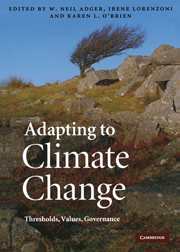Book contents
- Frontmatter
- Contents
- List of contributors
- Preface
- 1 Adaptation now
- Part I Adapting to thresholds in physical and ecological systems
- Part II The role of values and culture in adaptation
- 9 The past, the present and some possible futures of adaptation
- 10 Do values subjectively define the limits to climate change adaptation?
- 11 Conceptual and practical barriers to adaptation: vulnerability and responses to heat waves in the UK
- 12 Values and cost–benefit analysis: economic efficiency criteria in adaptation
- 13 Hidden costs and disparate uncertainties: trade-offs in approaches to climate policy
- 14 Community-based adaptation and culture in theory and practice
- 15 Exploring the invisibility of local knowledge in decision-making: the Boscastle Harbour flood disaster
- 16 Adaptation and conflict within fisheries: insights for living with climate change
- 17 Exploring cultural dimensions of adaptation to climate change
- 18 Adapting to an uncertain climate on the Great Plains: testing hypotheses on historical populations
- 19 Climate change and adaptive human migration: lessons from rural North America
- Part III Governance, knowledge and technologies for adaptation
- 31 Conclusions: Transforming the world
- Index
- References
17 - Exploring cultural dimensions of adaptation to climate change
insights for living with climate change
Published online by Cambridge University Press: 31 August 2009
- Frontmatter
- Contents
- List of contributors
- Preface
- 1 Adaptation now
- Part I Adapting to thresholds in physical and ecological systems
- Part II The role of values and culture in adaptation
- 9 The past, the present and some possible futures of adaptation
- 10 Do values subjectively define the limits to climate change adaptation?
- 11 Conceptual and practical barriers to adaptation: vulnerability and responses to heat waves in the UK
- 12 Values and cost–benefit analysis: economic efficiency criteria in adaptation
- 13 Hidden costs and disparate uncertainties: trade-offs in approaches to climate policy
- 14 Community-based adaptation and culture in theory and practice
- 15 Exploring the invisibility of local knowledge in decision-making: the Boscastle Harbour flood disaster
- 16 Adaptation and conflict within fisheries: insights for living with climate change
- 17 Exploring cultural dimensions of adaptation to climate change
- 18 Adapting to an uncertain climate on the Great Plains: testing hypotheses on historical populations
- 19 Climate change and adaptive human migration: lessons from rural North America
- Part III Governance, knowledge and technologies for adaptation
- 31 Conclusions: Transforming the world
- Index
- References
Summary
Introduction
The latest report of the IPCC states that ‘Warming of the climate system is unequivocal’ and that most of the warming over the past half-century is ‘very likely due to the observed increase in anthropogenic [greenhouse gas] concentrations’ (IPCC, 2007a, pp. 1, 4). A range of potentially damaging impacts of climate change is anticipated, some of which may be abrupt and irreversible, with potentially severe impacts on human and natural systems (IPCC, 2007b). It is a reasonable proposition that, in light of these conclusions, ethically responsible decision-makers ought to take appropriate action, be it in terms of prevention, mitigation or adaptation (see Jamieson, 2001; Gardiner, 2004).
Though anthropogenic climate change may be new, significant local and regional variations in climate have occurred throughout the historical period, and prehistoric modern humans lived through repeated periods of abrupt and severe climate change that was often global in nature, responding and adapting to environmental change and variation with varying degrees of success and a variety of different outcomes (for example Roberts, 1998; Brooks, 2006).
In this chapter, we propose that culture plays an important role in mediating human responses to environmental change. In particular, we argue that these responses depend heavily on the extent to which societies see themselves as separate from or part of the wider physical or ‘natural’ environment. A detailed discussion of the social construction of nature is beyond the scope of this chapter (but see Heyd, 2007).
- Type
- Chapter
- Information
- Adapting to Climate ChangeThresholds, Values, Governance, pp. 269 - 282Publisher: Cambridge University PressPrint publication year: 2009
References
- 12
- Cited by



